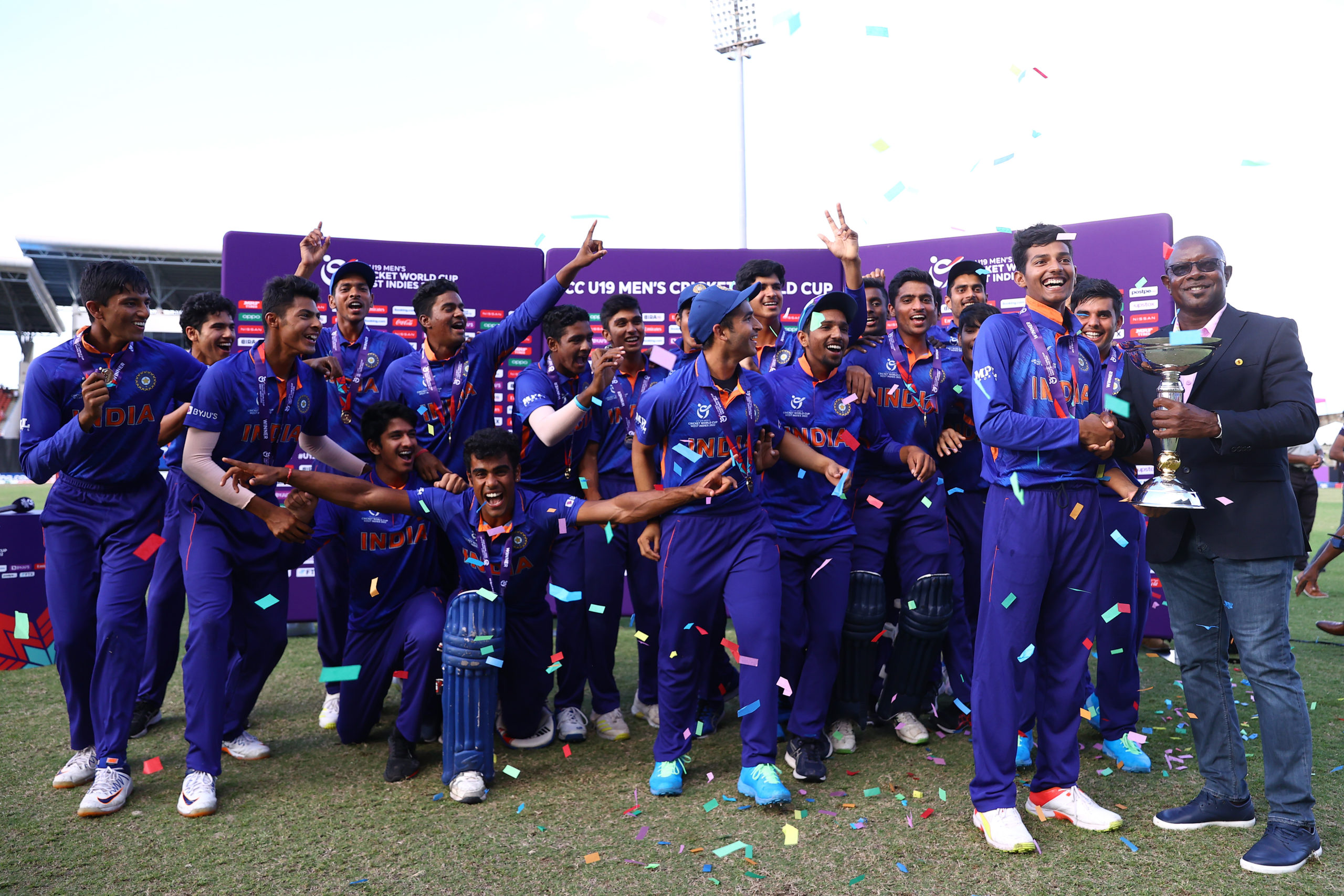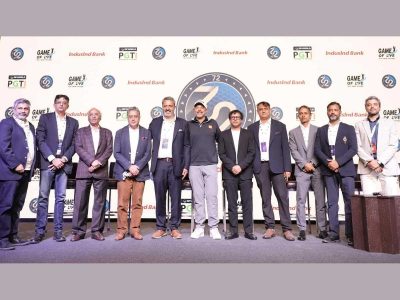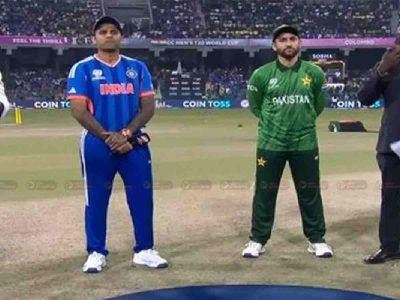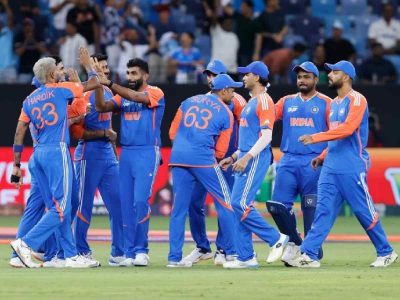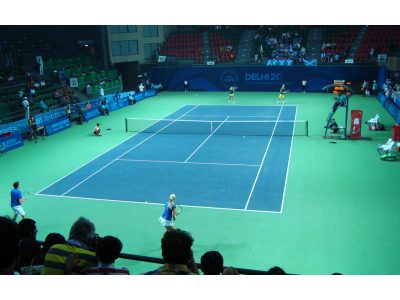India’s Under-19 cricket team lifted the trophy for the fifth time, largely due to Ravi Kumar and Raj Bajwa taking nine wickets between them
India have proved their superiority in the underage tournament once again by lifting the Under-19 World Cup title for the fifth time with a four-wicket win over England at Sir Vivian Richards Stadium in Antigua.
The winning script was written by India’s fast bowling duo of left-armer Ravi Kumar (9-1-34-4) and Raj Bawa (9.5-1-31-5) who shared a total of nine wickets between them to run riot on the England batting order, dismissing them for a modest 189 off 44.5 overs.
Bawa became the first Indian to take a five-wicket haul in an ICC event final. Bawa also contributed a valuable 35 (54 balls) with the bat and was involved in a crucial 67-run partnership for the fifth wicket with Nishant Sindhu (50). There were certainly tense moments, but the Indians’ batters never pressed the panic button, despite England taking the game as deep as possible.
On the other hand, English colts can also hold their heads high as they finished with the country’s best result in U-19 World Cups since 1998, the only time they have won the title. And they lost their only game to the Indian colts in 2022.
The Indian colts got off to their best possible start by removing in-form batsmen Jacob Bethel and Tom Prest inside the first four overs. These two had scored more than 200 runs for the tournament but were dismissed by left-arm speedster Ravi Kumar for two and nought, respectively. There was a small partnership then for England before Bawa struck twice in quick succession to leave the English reeling at 47.
A 93-run partnership for the eighth wicket between James Sales and James Rew helped England post a competitive total. Rew was out just shy of his century for a brilliant 95 that included 12 boundaries, while Sales finished 34 not out as England were all out for 189.
England, playing in their first final at this level for 24 years, had India struggling at 97 for four after Angkrish Raghuvanshi (0), the team’s highest run-scorer in the tournament, was back in the pavilion.
The Indian boys then played with caution as the duo of Harnoor Singh (21) and Shaik Rasheed (50) brought up the team’s 50 during the 19th over of the innings. The chase was ultimately pulled off by wicketkeeper-batter Dinesh Bana, who hit the winning six to win it for his country with 14 deliveries to spare.
However, it was South African batter Dewald Brevis who was named player of the tournament for his record of 506 runs, which included two centuries.
The result doesn’t mean that it was that easy for the Indian colts.
To start with, the Indian camp was hit by Covid-19 halfway through the tournament. Six cricketers, including skipper Yash Dhull, had to go into isolation. A situation came when the coaching staff had to carry drinks during the match. India did not have the full squad at their disposal until the final.
Profiles
India U-19 boys showed supreme skill and age-defying maturity to lift a record-extending fifth world title. Here we take a look at their careers so far.
Yash Dhull (captain)
The India U-19 skipper was in seven-day isolation after testing positive for the Covid virus before the quarterfinals against Bangladesh. But that didn’t deter this Delhi boy from making his presence felt in the tournament. Having been forced to sit out and do shadow practice in his hotel room during easy outings against Ireland and Uganda, his contribution of 20 runs against Bangladesh in a low-scoring game was enough to help his team enter the last four stages.
It was that game against Australia where Dhull showed his mettle by hitting an impressive 100. He has been named skipper of the ICC Most Valuable Team of the tournament based on these final three knocks.
Shaik Rasheed
In the absence of a regular skipper, Shaik Rasheed carried the weight of expectations. The 17-year-old No. 3 batter, hailing from Guntur in Andhra, contributed valuable 94 in the semi-final against Australia and followed it with another half-century in the all-important final against England.
It has been quite a difficult journey for Rasheed to reach this stage. The academy where Rasheed trained was 50 km from his home in Guntur. But his father ensured that he didn’t miss a single coaching session by ferrying Rasheed the entire distance on his scooter. His father even lost his job but moved cities to keep his son’s dream alive.
Harnoor Singh Pannu
An elegant left-handed batter and a specialist opener, Harnoor started his career on an empty piece of land in Jalandhar, bought by his father to train his elder brother. Having started initially as a medium-pacer, it was his grandfather Rajinder Singh who asked him to get serious about batting.
He shifted his base to Chandigarh and started training under his uncle, Harjinder Singh Pannu. Harnoor first came into the limelight after hitting three centuries in the Challenger Trophy. He struck a century against Australia in a warm-up game in the Caribbean. In the final match, he scored 21 off 36 balls, including three boundaries.
Raj Angad Bawa
Son of a noted coach Sukhwinder Singh Bawa in Chandigarh, Raj is a right-arm pacer but bats left-handed.
He was first noticed after picking four wickets against Pakistan in the Asia Cup, and he also scored a ton and took eight wickets in the three Challenger Trophy games. His father also coached former India player Yuvraj Singh, while his grandfather, Tarlochan Bawa, won an Olympic gold medal in hockey in 1948.
Raj and Harnoor have both been rewarded with a berth in the Ranji Trophy squad for Chandigarh.
Angkrish Raghuvanshi
The aggressive right-handed batter, Angkrish, 16, is the youngest player in the India Under-19 team. He moved to Mumbai from Delhi at the age of 11 and was coached by former domestic star Abhishek Nayar.
He hammered a fifty in the Asia Cup 2021 final against Sri Lanka. His father, Avneesh, has represented India in tennis, while his mother, Malika, has played basketball for the country.
Vicky Ostwal
Product of the Vengsarkar Academy in Thergaon, Chinchwad, Vicky is a left-arm orthodox spinner. Coming from Lonavala, a picturesque hill station in Pune, he was the player of the match in the Asia Cup 2021 final as he returned with fine figures of three for 11 and took eight wickets in five Asia Cup matches with an economy of 2.29.
Vicky’s ability to generate turn and bounce troubled all the teams in the WC. Though the Indian team was affected by a Covid-19 outbreak, Vicky was the lucky one to have played all the games. He finished third on the wicket-takers list with 12 scalps in five games, including a five-for against South Africa.
Nishant Sindhu
Having scored the most important half-century in the final against England, Haryana-lad Nishant has emerged as an attacking left-handed batter who is also a left-arm orthodox bowler.
He led his state junior team to the Vinoo Mankad Trophy title after 19 years and also led Haryana to a win in the U-16 Vijay Merchant Trophy in 2021.
Ravi Kumar
The son of a CRPF officer, Ravi is a left-arm pacer who played in the Vinoo Mankad Trophy for Bengal, in which he grabbed 11 wickets. He was the wrecker-in-chief against Bangladesh in the quarter-finals and also took four important wickets in the final.
Siddharth Yadav
He is a left-handed batsman who hails from Kotgaon in Ghaziabad. Siddharth’s father runs a provision store.
In the Vinoo Mankad Trophy, in seven innings, he scored 258 runs with an average of 43, including two half-centuries.
Dinesh Bana
Coming from Hisar district in Haryana, this wicket-keeper and right-handed batsman scored 255 runs, with a highest of 170, in the four Challenger Trophy matches.
Bana also impressed with his big-hitting skills in the semi-final against Australia.
Rajvardhan Hangargekar
Rajvardhan, a pacer and an attacking batter, lit up the World Cup with his performance with both bat and ball.
His consistent 140 kmph speed left South Africa’s top order huffing and puffing in the opening game. In the second outing against Ireland, the lanky cricketer hit as many as five towering sixes after walking in to bat at No. 5.
He, unfortunately, lost his father due to Covid-19 in June 2020.
Kaushal Tambe
He is an attacking right-handed batter and off-spinner, who was initially spotted by the former national selector and former Maharashtra coach Surendra Bhave during selection trials.
Born in Ootur village in Junnar tehsil of Pune district, which is the birthplace of Maratha warrior-king Chhatrapati Shivaji Maharaj, Tambe’s one-handed blinder catch of James Rew, batting on 95, restricted England in the final.
Garv Sangwan
He is a right-arm pacer who hails from Bhiwani in Haryana, a city known mainly for boxers and wrestlers. He was a part of the Vinoo Mankad-winning Haryana team.
Aaradhya Yadav
He is a wicket-keeper and a right-handed batter who is training under former India player Ajay Sharma in Ghaziabad. He scored 295 runs in seven innings for the Vinoo Mankad trophy, with an average of 42.1 and a best score of 131.
For more stories that cover the ongoings of Delhi NCR, follow us on:
Instagram: https://www.instagram.com/thepatriot_in/
Twitter: https://twitter.com/thePatriot_in
Facebook: https://www.facebook.com/Thepatriotnewsindia

